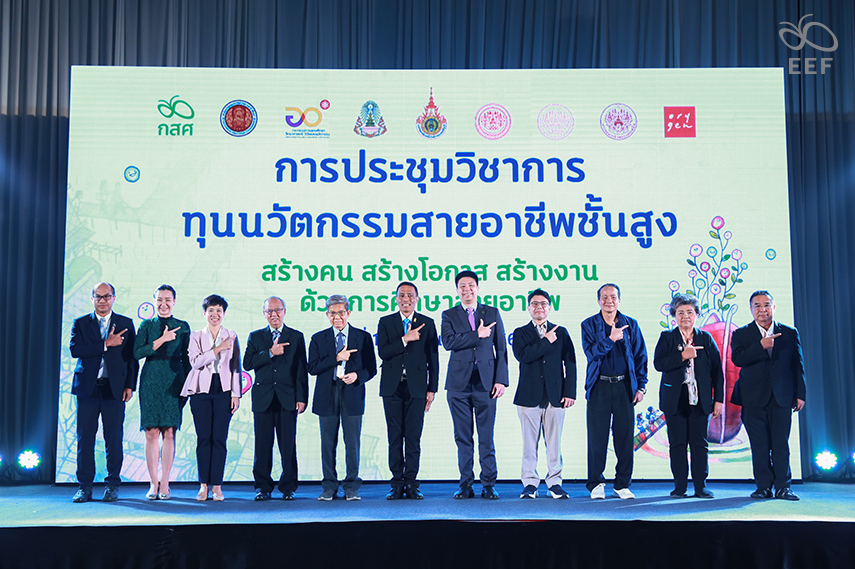
OVEC – EEF joining hands to produce a professional workforce and resolve inequality towards poverty-free intergeneration. Ready to join hands with the private sector in launching a model of 6 innovative educational institutions for a higher level of career and international potential in the youth.
On December 16, 2022 at the Centra by Centara Hotel, Government Complex and Convention Center, Bangkok, the Equitable Education Fund (EEF) in collaboration with the Office of the Vocational Education Commission (OVEC), Ministry of Higher Education, Science, Research and Innovation (MHESI), Rajamangala University of Technology Thanyaburi, King Mongkut’s University of Technology Thonburi, King Mongkut’s University of Technology North Bangkok, King Mongkut’s Institute of Technology Ladkrabang, Chulalongkorn University, Rajanagarindra Child and Adolescent Mental Health Institute, Community Nurse Network Foundation, and ORYGEN Institute, Australia, co-organized the High Vocational Innovation Scholarship Conference 2022 “Creating People, Creating Opportunities, Creating Jobs with Vocational Education” as a forum for exchanging knowledge, experiences and developing policy proposals about the development of vocational manpower to resolve the problem of educational inequity and creating educational opportunities for underprivileged youths to pursue their education in advanced career studies.
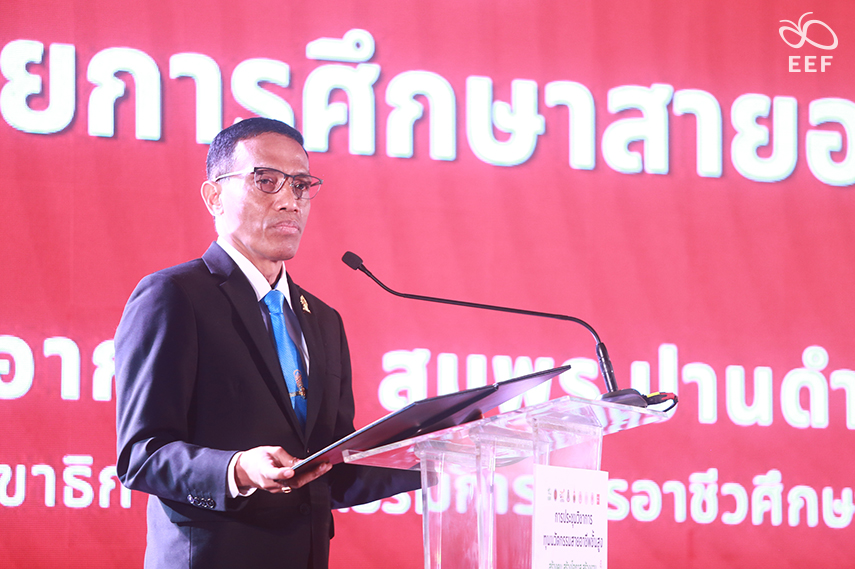 Flying Officer Somporn Pandam,
Flying Officer Somporn Pandam,
Deputy Secretary-General of the Vocational Education Commission
Flying Officer Somporn Pandam, Deputy Secretary-General of the Vocational Education Commission, said that the vocational innovation scholarship shall promote economic development and capitalization for multiple colleges in producing 2,500 workforces per year. It is also an important channel accessible to all areas nationwide of EEF, while upgrading the level of guidance system, creating an awareness on vocational education in connection with secondary schools, as well as bringing children from the system for their vocational education. This is considered as a process consistent with the government’s goals towards the strength of vocational skills under the collaboration with EEF. Therefore, the country and the economy are also driven. Thanks to EEF for foreseeing the importance of underprivileged youth and offer educational opportunities to vocational students. This leads to our promise from us, as the vocational educational people, to move forward according to our set out plans in conjunction with EEF and a driving force to meet the country’s needs and promote the creation of best career opportunities. Besides the continuing education and having jobs, vocational students must develop to become entrepreneurs and escape from poverty.
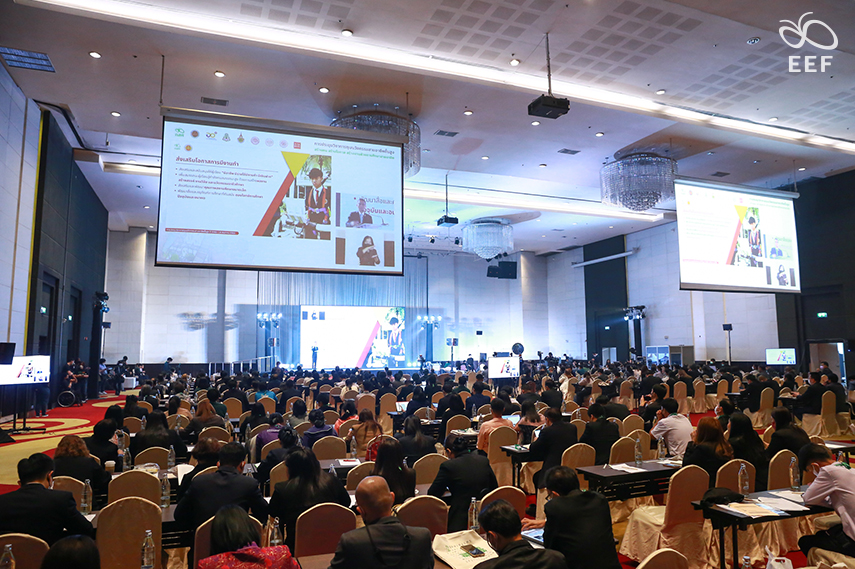
“Many educational institutions wish to join the network like us, but they still can’t do it. Today, it is important for us to upgrade the level and expand our results on the reduction of educational inequity throughout the country. If the vocational education system is strong, the country will benefit from the EEF’s driving forces towards the economic movement,” said Flying Officer Somporn.
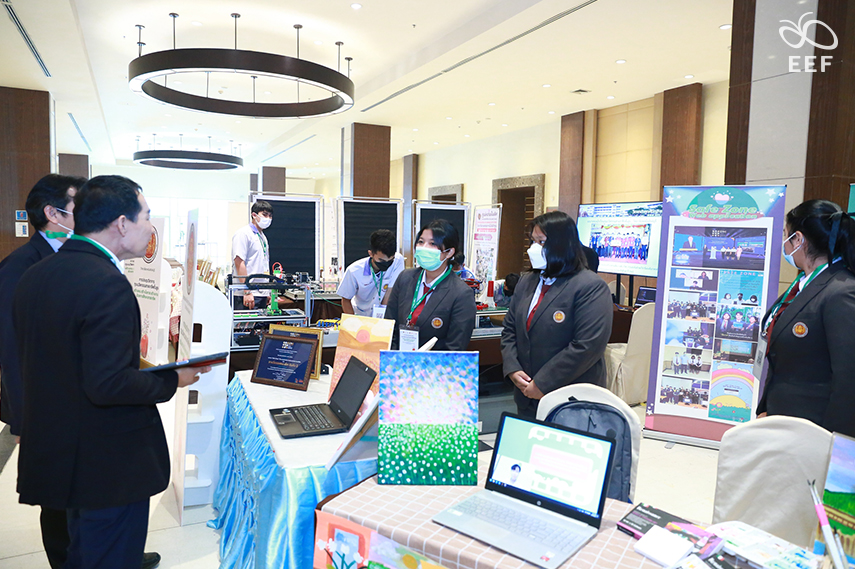
Flying Officer Somporn continued that VEC works as an alliance with vocational schools from both the public and private sectors of all affiliates. This is the implementation of policies with EEF and network partners to create results in two important aspects: 1. Expanding scholarships for the needy and underprivileged youth in addition to the support by EEF of only 1% per group or 2,500 scholarships per year through multi-sectional cooperation with resources to reduce educational inequity, 2.Promoting administrators, teachers and vocational schools in caring of youth to cover all dimensions, including education, mental health, career and employment opportunities. This advanced vocational innovation scholarship is another important channel to create educational opportunities for poor and underprivileged youths and help resolve the problems of poverty and income inequity in various dimensions.
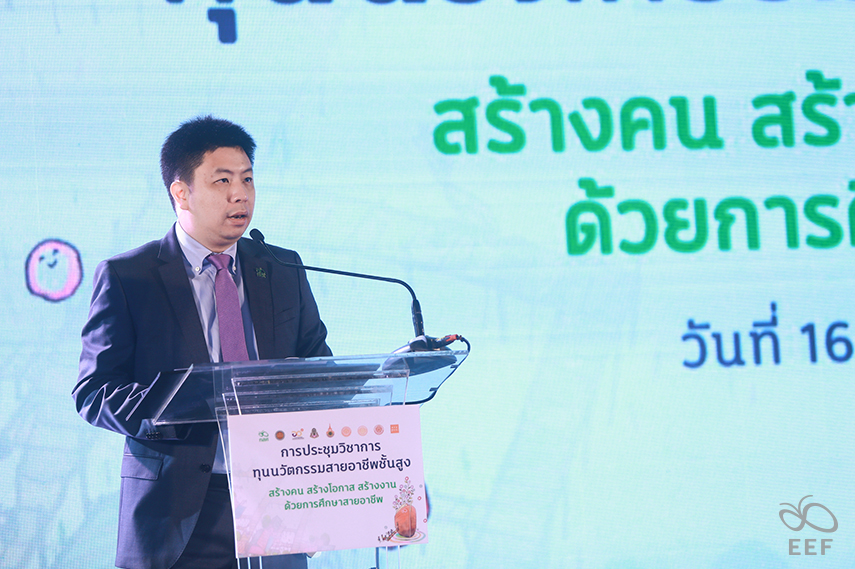 Dr. Kraiyos Phatrawat, the Manager of Equitable Education Fund (EEF)
Dr. Kraiyos Phatrawat, the Manager of Equitable Education Fund (EEF)
Dr. Kraiyos Phatrawat, the Manager of Equitable Education Fund (EEF), said that the Advanced Vocational Innovation Scholarship Program of EEF has been in operation since 2019, which could create educational opportunities for poor and underprivileged students who have been selected by educational institutions with their participation. There are a total of 9,614 scholarship students, 300 of whom have special needs and another 3,056 have graduated. Currently, EEF is accepting the applications from scholarship recipients for the academic year 2023 to study in vocational institutions, community colleges, Rajamangala University of Technology, Chitralada Institute of Technology, and others. There are 116 vocational institutions in 44 provinces that offer vocational certificates and diploma courses of more than 30 fields, in accordance with 10 target industries of the government’s policy. This also responds to the needs of national and local labor markets, such as mechanical engineering, logistics management, production techniques, computer graphics and agricultural industry. Those who graduate can have a job immediately upon their graduation.
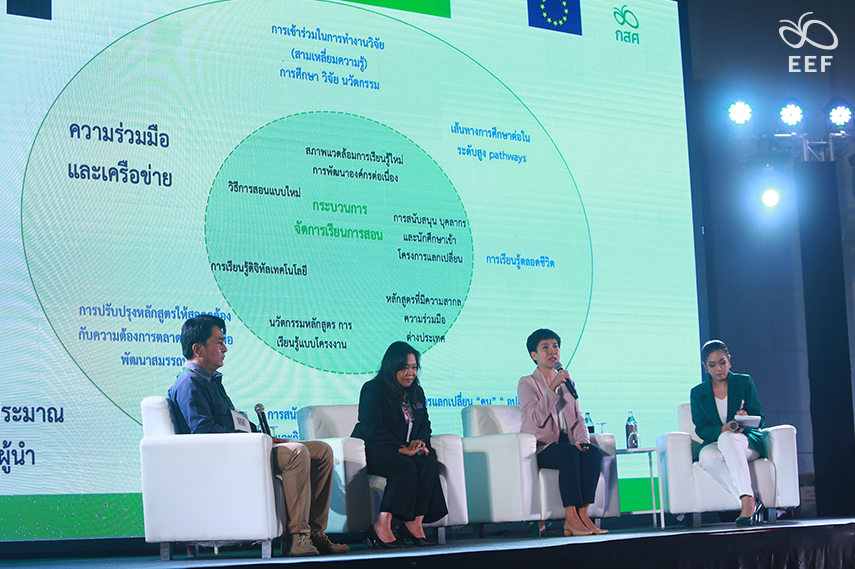
“The Advanced Vocational Innovation Scholarship Program is the flagship of the EFF as part of educational opportunities for low-income families. It is in accordance with the 13th National Economic and Social Development Plan in the 9th objective for Thai youths to escape from poverty and middle-income barriers as an crucial force in the country’s development. This is because Thai youths are comparable to others in the world. If we develop, commit, support and push the underprivileged youths towards their career paths, this will help them escape from their poverty towards middle income and high income groups in the future, ”said the EEF manager.
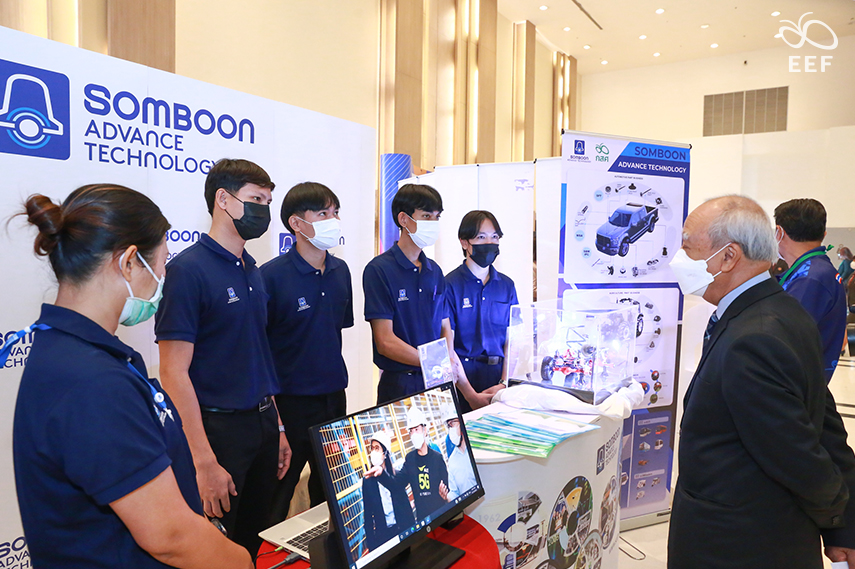
In addition, EEF has also developed a model for 6 innovative educational institutes, including Rajamangala University of Technology Lanna, Lamphun College of Agriculture and Technology, Singburi Technical College, Phra Nakhon Si Ayutthaya Technical College, Siam Technology College (Siam Tech), Phang Nga Technical College, in 7 fields of innovative educational institute development, namely science-based service technology, science-based agricultural biotechnology, rail transportation control and maintenance techniques, electronics, mechatronics, pre-engineering science and computer graphics distributed in 8 provinces, such as Bangkok, Chiang Mai, Chiang Rai, Lamphun, Tak, Sing Buri, Phra Nakhon Si Ayutthaya and Phang Nga. This is a pro-active work to develop model educational institutions as a source of learning through the cooperation and joint-investment from the private and government sectors in the development of model educational institutes, e.g., the State Railway of Thailand, Betagro Public Co., Ltd. and Somboon Advance Technology Public Co., Ltd., etc.
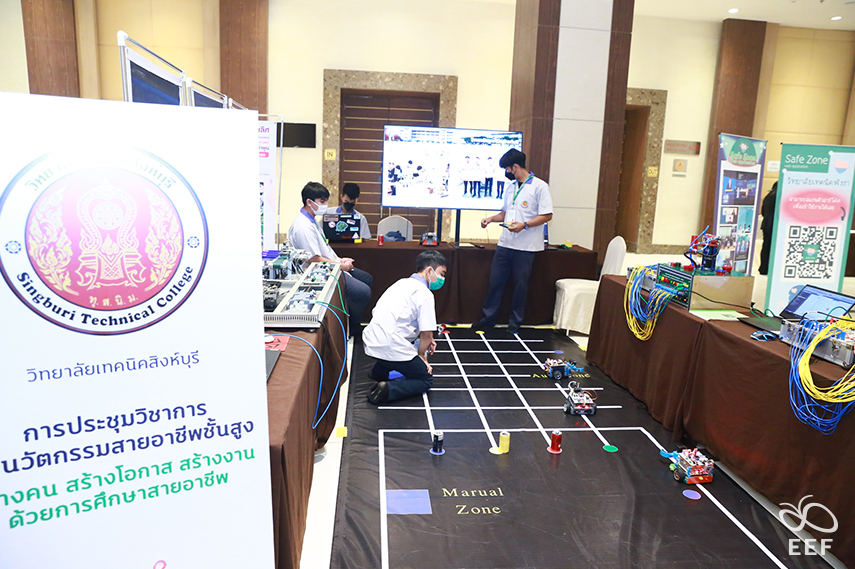
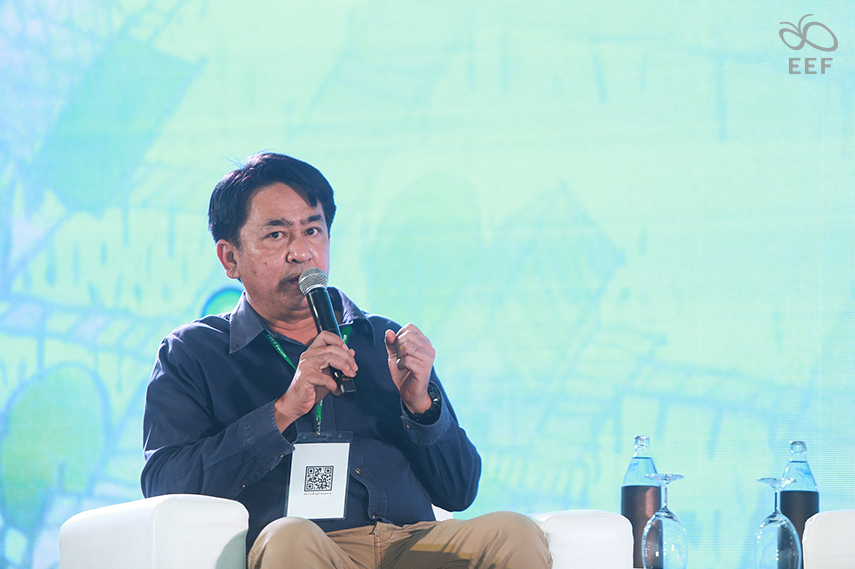 Mr. Pornthep Charoenphonchan, the Community Relations Manager
Mr. Pornthep Charoenphonchan, the Community Relations Manager
Meanwhile, Mr. Pornthep Charoenphonchan, the Community Relations Manager, Betagro Public Co., Ltd., said that the key for educational development to meet the needs of the country’s labor forces must be from the cooperation between private sector and educational institutes in the future under the form of bilateral projects, especially in the common practice level. However, the funding model of EEF is an opportunity to create cooperation and facilitate the transition between enterprises and educational institutions. EEF not only provides scholarships to students but also help in the development of courses for education institutions in collaboration with entrepreneurs to produce students who can meet the needs.
“When Betagro wishes for what type of people to work with us, we can discuss with the community for the skills and needs of workers we want. We exchange ideas and join in the curriculum development together towards educational opportunities for children in the community for their employment,” said Mr. Pornthep.
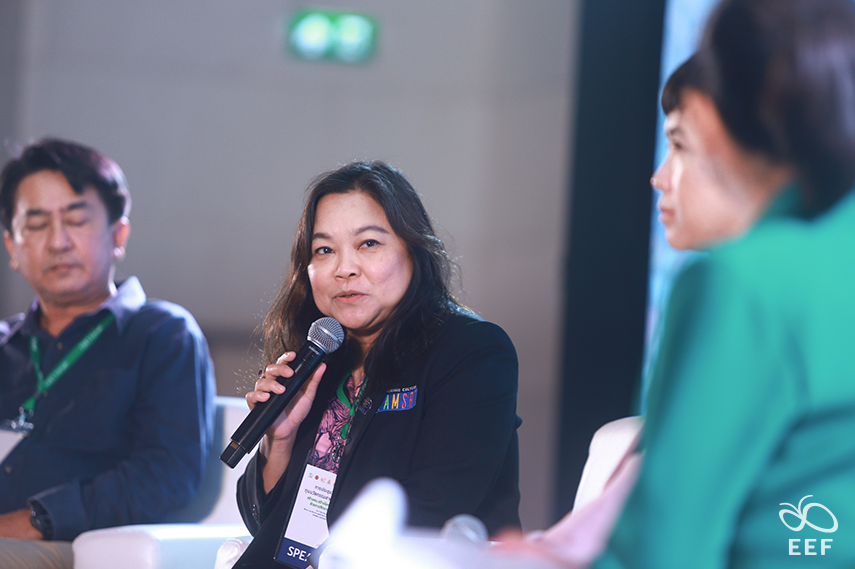 Ms. Kanrawee Thongpool, Head of Railway Training Center Office,
Ms. Kanrawee Thongpool, Head of Railway Training Center Office,
The State Railway of Thailand (SRT)
Ms. Kanrawee Thongpool, Head of Railway Training Center Office, the State Railway of Thailand (SRT), said that the railway school emphasizes practical knowledge of the railway systems. The instructors are all operators of the organization. However, the rail industry in Thailand is currently growing at a fast pace, allowing the railway school to provide opportunities for students in various learning modes and they can choose to work in other private organizations. This is through the collaboration with the private sector and the network of educational institutions in creating quality courses that can actually meet the needs of the industry, which would enhance the learning of life skills, so that students can adapt to work outside and meet the growing demand for labor in the domestic rail system industry.

